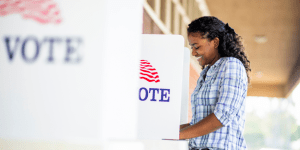 Have you ever wondered why the presidential primary drags on for months? Why does Iowa get to vote first? And what even is a caucus?
Have you ever wondered why the presidential primary drags on for months? Why does Iowa get to vote first? And what even is a caucus?
Politics and elections can make the savviest of us tear our hair out in frustration. Primary elections in particular happen in a sequence that may not be intuitive, especially for first time voters. But democracy is important, and we here at the Canton Public Library love to support an informed electorate and foster a healthy democracy. So read on to learn about the upcoming primary season and why it is… the way that it is.
The first thing to understand is that the Constitution does not have rules on how to hold a primary election. It describes the Electoral College, a system for electing the president where each state gets a proportional number of votes based on their population. The writers were explicitly against political parties at the time, so the first two elections that gave us President George Washington didn’t bother with a lengthy nomination process, it was all handled by the Electoral College.
Two major parties emerged after this. The members of Congress associated themselves with one of these groups, and then voted amongst themselves to nominate their respective candidate for president. This was called a caucus. Starting in 1832, this system was replaced by nominating conventions. Each state was apportioned a certain number of delegates, the delegates were chosen at local caucuses, and these delegates got to nominate candidates at a national convention hosted by their respective party.
This lasted up until the early 1900s when some states switched to holding primary elections as a way to divide up their delegates, the argument being that it was more accessible to voters. It was still a pretty opaque process that a lot of people were unhappy with. The rules for delegates were not well defined or well regulated, and led to some pretty sticky situations at the nominating conventions where party insiders held more sway than actual voters.
The Democratic National Convention of 1968 was particularly disastrous. After Robert F. Kennedy was assassinated in June of that year, the delegates he had already earned went up for grabs. The situation was compounded by protests and demonstrations that led to chaos throughout the convention. Ultimately, Hubert Humphrey won the nomination despite not entering any of the state primaries and subsequently lost the general election to Richard Nixon.
The whole thing made everyone very upset.
So, the Democratic National Committee formed a commission that would write new rules on how states select delegates. They wanted to make the process more fair, transparent and accessible to diverse groups of people. One of their new rules was to spread out the process over a longer period of time. States now had to wait 30 days between certain events like local caucuses and state conventions. Iowa held a lot of these events, therefore they had to start their processes very early. So, during the first election under these new rules in 1972, they were the first state to caucus in January. Iowa subsequently got a lot of attention because they were the first to caucus, and they liked it so much that eventually the state enshrined a rule into law that says they have to be the first caucus.
Meanwhile, New Hampshire had enjoyed the status of holding the first primary election in the nation for a while. After the rules changed and Iowa took the earliest spot, New Hampshire passed a law saying that it had to hold the first primary election in the United States.
Today, some states hold caucuses where nominees are decided through face-to-face debate and discussion, and some states hold primary elections where nominees are chosen within the privacy of a voting booth.
Michigan will hold its primary election on February 27, 2024. If you will be eligible to vote in the general election in November, you are eligible to vote in this primary. You will be able to choose between voting for the Republican nominee or for the Democratic nominee. Republicans will be choosing between Ron DeSantis, Nikki Haley, Asa Hutchinson, Vivek Ramaswamy and Donald Trump. Democrats will be choosing between Joe Biden, Marianne Williamson and Dean Phillips. After all the states caucus and vote, the winners of these contests will be officially nominated at their respective party conventions and then face each other in the 2024 Presidential Election in November.
Not sure if you are registered to vote? You can visit the Michigan Secretary of State website to check your registration. Michigan offers same-day voter registration if you visit your city or township clerk’s office before 8:00 PM on election day. Of course, it’s better to get it taken care of before then to ensure there won’t be any hiccups when you go to cast your ballot.
Helpful Links and Further Reading
- Constitution Center: Why Iowa and New Hampshire Go First.
- Primary Information from the Michigan Secretary of State.
- Online voter registration is available in Michigan with proper documentation.
- Learn about being an election worker (16 and 17-year-olds are eligible).
- Vote 411 provides additional information about voting.



Add a comment to: Io—what? Breaking Down Presidential Primaries for Teens